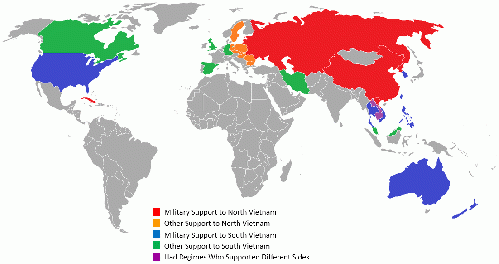Readings for the 27th Sunday in Ordinary Time: IS 5:1-7; PS 80:9, 12-16, 19-20; PHIL 4: 6-9; MT 21: 33-43
For the past week, I've been watching episodes of Ken Burns' and Lynn Novick's PBS production "The Vietnam War." The series has ten episodes, each about an hour and a half long. So far I've seen three.
I bring it up because the viewing experience has relevance to this morning's Gospel reading which describes resistance to a landlord system similar to the one that provoked Vietnam's peasantry to take up arms.
Such local motivations remain obscured by Burns and Novick. The official story they tell is that of a geopolitical struggle between China and Russia on the one hand and the U.S. and France on the other. So the film's narrative is dominated by maps depicting huge swaths of geography (China and Russia) looming menacingly over Vietnam. The maps indicate that Vietnam along with the rest of French Indochina (including Laos and Cambodia) were threatened by monolithic communist takeover.
U.S. officials one after another describe their alarming "domino theory" contending that if Vietnam were "lost" to communism, so would Laos, Cambodia, Korea, Japan, the Philippines and the rest of Far East. It wouldn't be long before Ho Chi Minh's forces would be landing in Hawaii and then in California.
So viewers are asked to believe that in the footage showing huge numbers of Vietnamese civilians (including the elderly, women and children) moving equipment, building bridges, ferrying supplies, we are simply witnessing mindless agents of China and Russia. The Vietnamese were somehow persuaded to risk their lives (four million of them were killed in the conflict) to advance the totalitarian cause of Sino-Soviet world conquest.
As John Pilger and others have written, that simply doesn't stand to reason. For one thing, there was no monolithic alliance between Russia and China. Any semblance of that lay in ruins between the years 1960 and 1989.
That is, for the Vietnamese, what they call "The American War" (1960-75) could not have been fought on behalf of China or Russia. Rather, the conflict represented a struggle against colonial rule by French and American forces. It was also fought against a rent system that had peasants paying predatory tribute to absentee landlords. The latter were holed up in Saigon along with other beneficiaries of deteriorating colonial arrangements including its dysfunctional army, government officials, and participants in the supporting infrastructure.
Meanwhile, outside of Saigon, the peasants' revolutionary army (the Viet Cong) defended farmers against rent collection. They had the peasantry stop traveling to Saigon to pay their land fees. This, they said, would force representatives of the landlord class to venture out into territory controlled by the Viet Cong to collect their money or in-kind revenue. And there in the countryside they would be duly slaughtered.
In other words, patriotism and the peasants' immediate economic interest, not geo-political considerations, provided their main motivations for resistance to a colonial rental system that had long exploited them and caused their families to starve.
All of this has relevance to this morning's Gospel episode where Jesus tells a story that parallels the situation I've just described. Jesus and his audience too were living under an imperial system not unlike Vietnam's. The Romans controlled Palestine using tactics highly similar to those of the French and Americans in Indochina. The system's administrators, armies, police, and hangers-on were all holed up in Jerusalem protected by Roman legions.
Meanwhile, absentee administrators and landlords kept the province's peasants impoverished by exacting rent and taxes that the farmers detested. The latter resisted accordingly -- at times in Israel's history forming armies of resistance similar to the Viet Cong. One of those militias was known as the Zealots.
In any case, the parable centralized in this morning's gospel has Jesus problematizing a situation of violent peasant conflict over rent collection. In so doing, Jesus, no doubt, provoked a spirited discussion among his listeners about colonialism, landlordism, and about violent vs. non-violent resistance.
Jesus' story goes that an absentee landlord has rented out his vineyard. Peasants are resisting payment. So the man in the Big House sends out no doubt well-armed rent collectors. After the first ones are murdered by the farmers, he sends out what was probably a small army of "enforcers." But the peasants successfully defeat them too. Eventually, the landlord gets more serious. His own son heads up a collection force probably much larger and better armed than its predecessors. But surprisingly, the renters wipe them out as well. They assume ownership of the land in question presumably under some ancient version of the revolutionary slogan "Land to the tiller."
That said, the Master's articulates the problem that certainly provoked spirited discussion in his audience. "What will happen," Jesus asks, "to the revolutionaries demonized as 'wicked' by the landowning class?"
(Note: You can view every article as one long page if you sign up as an Advocate Member, or higher).






